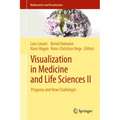Modeling, Analysis, and Visualization of Anisotropy: Mathematics and Visualization
Editat de Thomas Schultz, Evren Özarslan, Ingrid Hotzen Limba Engleză Hardback – 15 oct 2017
This multidisciplinary book is the sixth in a series that aims to foster scientific exchange between communities employing tensors and other higher-order representations of directionally dependent data. A significant number of the chapters were co-authored by the participants of the workshop titled Multidisciplinary Approaches to MultivaluedData: Modeling, Visualization, Analysis, which was held in Dagstuhl, Germany in April 2016. It offers a valuable resource for those working in the field of multi-directional data, vital inspirations for the development of new models, and essential analysis and visualization techniques, thus furthering the state-of-the-art in studies involving anisotropy.
| Toate formatele și edițiile | Preț | Express |
|---|---|---|
| Paperback (1) | 793.79 lei 38-45 zile | |
| Springer International Publishing – 30 aug 2018 | 793.79 lei 38-45 zile | |
| Hardback (1) | 956.50 lei 6-8 săpt. | |
| Springer International Publishing – 15 oct 2017 | 956.50 lei 6-8 săpt. |
Din seria Mathematics and Visualization
- 20%
 Preț: 935.20 lei
Preț: 935.20 lei - 18%
 Preț: 960.93 lei
Preț: 960.93 lei - 18%
 Preț: 1110.41 lei
Preț: 1110.41 lei - 20%
 Preț: 994.26 lei
Preț: 994.26 lei - 18%
 Preț: 1220.57 lei
Preț: 1220.57 lei - 18%
 Preț: 958.38 lei
Preț: 958.38 lei - 15%
 Preț: 654.62 lei
Preț: 654.62 lei - 20%
 Preț: 997.38 lei
Preț: 997.38 lei - 15%
 Preț: 645.47 lei
Preț: 645.47 lei - 5%
 Preț: 1101.58 lei
Preț: 1101.58 lei - 20%
 Preț: 992.44 lei
Preț: 992.44 lei - 20%
 Preț: 1284.47 lei
Preț: 1284.47 lei - 20%
 Preț: 656.69 lei
Preț: 656.69 lei - 20%
 Preț: 476.68 lei
Preț: 476.68 lei - 20%
 Preț: 1273.08 lei
Preț: 1273.08 lei - 15%
 Preț: 649.54 lei
Preț: 649.54 lei - 20%
 Preț: 335.36 lei
Preț: 335.36 lei - 20%
 Preț: 646.95 lei
Preț: 646.95 lei - 20%
 Preț: 651.75 lei
Preț: 651.75 lei - 20%
 Preț: 657.99 lei
Preț: 657.99 lei - 18%
 Preț: 1223.74 lei
Preț: 1223.74 lei - 20%
 Preț: 333.72 lei
Preț: 333.72 lei - 20%
 Preț: 709.98 lei
Preț: 709.98 lei - 18%
 Preț: 1236.38 lei
Preț: 1236.38 lei - 20%
 Preț: 992.26 lei
Preț: 992.26 lei - 20%
 Preț: 648.44 lei
Preț: 648.44 lei - 20%
 Preț: 1158.59 lei
Preț: 1158.59 lei - 20%
 Preț: 330.66 lei
Preț: 330.66 lei - 18%
 Preț: 963.91 lei
Preț: 963.91 lei - 15%
 Preț: 653.98 lei
Preț: 653.98 lei - 20%
 Preț: 991.94 lei
Preț: 991.94 lei - 18%
 Preț: 958.07 lei
Preț: 958.07 lei
Preț: 956.50 lei
Preț vechi: 1166.47 lei
-18% Nou
Puncte Express: 1435
Preț estimativ în valută:
183.03€ • 195.72$ • 152.60£
183.03€ • 195.72$ • 152.60£
Carte tipărită la comandă
Livrare economică 18 aprilie-02 mai
Preluare comenzi: 021 569.72.76
Specificații
ISBN-13: 9783319613574
ISBN-10: 331961357X
Pagini: 407
Ilustrații: X, 407 p. 150 illus. in color.
Dimensiuni: 155 x 235 mm
Greutate: 0.76 kg
Ediția:1st ed. 2017
Editura: Springer International Publishing
Colecția Springer
Seria Mathematics and Visualization
Locul publicării:Cham, Switzerland
ISBN-10: 331961357X
Pagini: 407
Ilustrații: X, 407 p. 150 illus. in color.
Dimensiuni: 155 x 235 mm
Greutate: 0.76 kg
Ediția:1st ed. 2017
Editura: Springer International Publishing
Colecția Springer
Seria Mathematics and Visualization
Locul publicării:Cham, Switzerland
Cuprins
Part I: Features and Visualization.- Part II: Image Processing and Analysis.- Part III: Diffusion Modeling and Microstructure.- Part IV: Tractography.- Part V: Machine Learning Approaches.
Textul de pe ultima copertă
This book focuses on the modeling, processing and visualization of anisotropy, irrespective of the context in which it emerges, using state-of-the-art mathematical tools. As such, it differs substantially from conventional reference works, which are centered on a particular application. It covers the following topics: (i) the geometric structure of tensors, (ii) statistical methods for tensor field processing, (iii) challenges in mapping neural connectivity and structural mechanics, (iv) processing of uncertainty, and (v) visualizing higher-order representations. In addition to original research contributions, it provides insightful reviews.This multidisciplinary book is the sixth in a series that aims to foster scientific exchange between communities employing tensors and other higher-order representations of directionally dependent data. A significant number of the chapters were co-authored by the participants of the workshop titled Multidisciplinary Approaches to MultivaluedData: Modeling, Visualization, Analysis, which was held in Dagstuhl, Germany in April 2016.
It offers a valuable resource for those working in the field of multi-directional data, vital inspirations for the development of new models, and essential analysis and visualization techniques, thus furthering the state-of-the-art in studies involving anisotropy.
Caracteristici
Includes works performed in very different areas as long as they are consistent with the central theme of the book Will help to enable transfer of knowledge between different disciplines potentially leading to significant advances Will bridge the gap between application-oriented and theoretical studies Great resources for junior scientists and those who would like to have an up-to-date information on the ongoing developments
